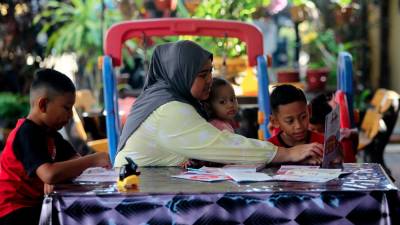Need to prepare children for digital world challenges

PETALING JAYA: With the barrage of fake news and misinformation that has deluged the internet, an expert has called for media and digital literacy to be integrated into the early childhood curriculum.
Universiti Teknologi Mara Communication and Media Studies professor Datuk Dr Azizul Halim Yahya said his suggestion is not a choice, but vital to navigate the modern information landscape.
“There is a critical need for media literacy in education to address the challenges posed by misinformation, disinformation and misuse of content to create ‘deepfakes’.
“Understanding the credibility of information sources is a fundamental skill that must be instilled from very young so that children can learn to differentiate truth and lies from an early age,” he said.
Calling critical thinking the bedrock of media literacy, he said the education system should take the responsibility to teach how to assess credibility.
“By doing this, we can foster skills that encourage students to question, evaluate evidence and draw informed conclusions. We can empower them to navigate the complexities of the information age.”
Azizul said navigating online platforms and understanding how digital content is created is also crucial to prepare children for the digital world they will inhabit.
“Social media platforms often rely on algorithms to curate and personalise content for users based on their preferences, past behaviour and demographic information.
“While users, including children, can choose who to follow, what content to engage with and what to share, these algorithms play a significant role in shaping the content that appears in their feeds,” he said.
Azizul called for collaborative efforts between educators, parents, and policymakers to ensure the success of a holistic media literacy curriculum.
“Parents and teachers must be prepared with the materials that align with developmental stages, incorporating engaging examples and fostering discussions that resonate with young learners’ experiences.”
He said interactive methods are essential for capturing young students’ attention in early childhood education.
“Storytelling, playing cards, hands-on activities and age-appropriate multimedia, including role-playing scenarios and group discussions will enhance their understanding of human rights and digital and media literacy.”
Azizul said workshops on media and digital literacy and human rights education will help educators to effectively meet the requirements to tackle misinformation and disinformation that students encounter.
“Teachers need ongoing training and support from private companies to keep up with new technology.
“Regular updates to the curriculum and working with technology experts help educators understand the latest trends,” he said.
Centre for Independent Journalism executive director Wathshlah Naidu said as young minds, especially teenagers, begin to navigate the digital world’s complex landscape, it is imperative to equip them with the necessary skills to critically analyse, interpret and engage with information at their fingertips.
Wathshlah said understanding and embracing human rights represents the initial stride towards media and digital literacy.
“Without incorporating human rights education, especially among early childhood pupils and older students, media and digital literacy will remain unattainable.”
She added that it is essential to promote human rights education that emphasises values like equality, justice and dignity as these lay the foundation for socially responsible individuals.
from Highlights https://ift.tt/9EfUI3h
via IFTTT
Nhận xét
Đăng nhận xét